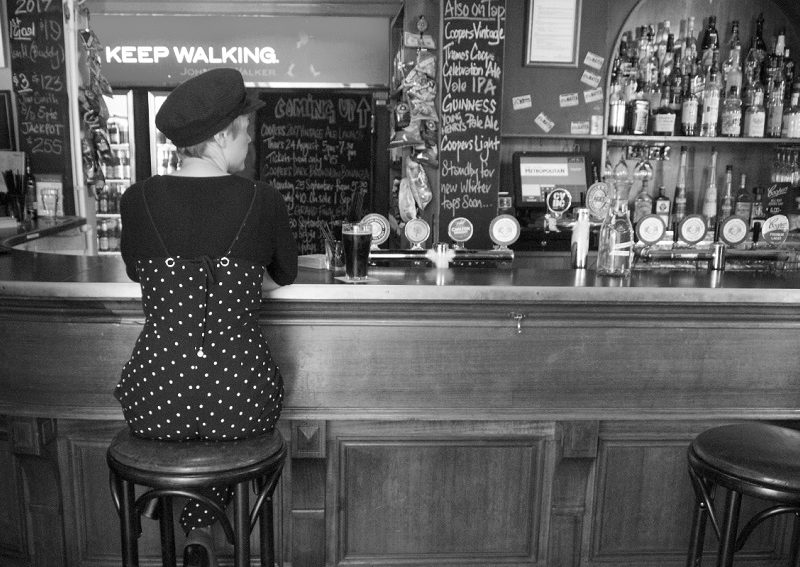
Royce Kurmelovs
Royce Kurmelovs is an Australian freelance journalist and author of The Death of Holden (2016), Rogue Nation (2017) and Boom and Bust (2018).

It is quiet on this lonely Sunday night at 55ml, the neighbourhood dive on the edge of Chinatown.
Outside, the neon glows in the cold and the asphalt is slick with rain. Inside, the bar is warm and mostly empty except for the barman, Dan Thorpe, who is busy counting bottles.
“Last week the owners had a going away party and nearly drank the place dry,” Dan says. “We went through 12 bottles of everything and all the shiraz.”
Dan wears a blue check shirt, light stubble and a white bar towel slung over his shoulder. He’s only been in the job for about four months. Before that, he was a regular.
Other nights of the week, Dan says, the bar is packed. No other bar in the neighbourhood has the same feel. Sunday nights are something else, so when Dan is on shift, his friends come in to hang out.
There are two others in the bar with him tonight. Olivia, a theatre designer, who is waiting for a friend, and Larissa, a 25-year-old ballerina and part-time construction worker, who has been dancing since she was three. She is sorting through the darts to find three that aren’t broken when she and Dan begin to talk music.
“So many musical artists,” Larissa says, “you see them on stage and they don’t have any dance experience, so they don’t know how to play for dancers.”
Dan, a classically trained pianist, agrees.
“I was once told by someone that I had no respect for the culture of pianism,” Dan says. “And they were right. I don’t give a fuck about Beethoven.
“I’m thinking of putting that in my press bio,” he adds a moment later.
Away from the bar, Dan is a working musician and pianist who grew up out in Elizabeth. As a kid, he wanted to play the violin. His father preferred he play the guitar.
“It was more hetero,” Dan explains.
Piano was a compromise, so Dan trained to be a concert pianist right up until he picked up a repetitive stress injury playing with a pit orchestra at a local high school. They were taping a rehearsal and had him playing electric piano with no foldback for five hours straight.
That was enough to keep him from playing professionally for almost a decade, a life event for which he is grateful.
Instead of classical piano, Dan began to compose. With time, he found work that fit his body and began to play again, just on his terms. Gone were the dead, 17th century virtuosos. Instead he discovered living Australian composers whose work was more about movement than the notes.
This is why Dan can talk to you at length about obscure musical figures like Dominique Phinot. He also makes a mean espresso martini, not that everyone appreciates the skill.
“You’ll love this,” Dan says, as he breaks into a story about how, a couple of weeks back, a group belonging to the Labor Right came in for a drink. They were in town for a conference and after sitting down at the boomerang counter and ordering a round, they asked Dan whether he was in a union.
Like most working musicians, Dan explained, he was a paid-in-full member of the MEAA. They laughed and called his union useless. Dan said maybe they were, but fired back with a line about how at least they weren’t selling him out to Coles like the SDA.
A bartender who could talk union politics made them curious. They asked him where he was from, so Dan told them. Then they asked him what he thought about west Sydney, and Dan said it was fine. They asked if Dan was studying, so he told them he had a masters in philosophy.
“How’s that working out for ya?” they asked.
After eight rounds of top shelf gin, one then begged Dan to let him help clean because he had “never mopped before”. On the way out the door, they linked arms and sang the Internationale.
“So much for solidarity with the working classes,” Dan says, summing up.
But then, Dan wasn’t fazed. He gets all types. Every night brings a catalogue of different humans. There are awkward Tinder dates and the couples carrying on affairs. A couple of times half the cast from The Book of Mormon have swung by for drinks after a show.
There’s even one guy in the neighbourhood, a primly dressed man who walks around the block muttering to himself. Every night, he’ll walk in and pour himself a glass of water before he leaves. As far as Dan is concerned, that man has as much right to it as any regular.
“It’s not about booze,” Dan says. “Places like this are about community. Being a bartender is never about the booze. Half the job is talking. Most of the rest is cleaning.
“The remaining 15 per cent is some cocktail of pouring beers and chaos.”

Royce Kurmelovs is an Australian freelance journalist and author of The Death of Holden (2016), Rogue Nation (2017) and Boom and Bust (2018).